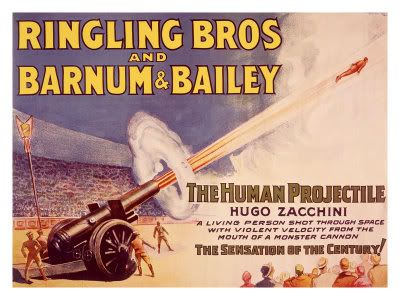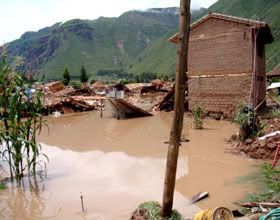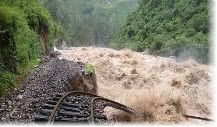Author's posts
Feb 14 2010
Happy Year Of The (Almost Extinct) Tiger
The Tiger is almost extinct. This situation is beyond disquieting. It’s a very scary, dire one for our small planet. As Meteor Blades wrote yesterday
“Sometimes fury and despair are the only responses that one can come up with. It seems as if nothing anybody does – laws, scoldings, appeals to people’s better nature – will stop this needless, heedless destruction.
Please join me in the jungle in Asia.
Feb 13 2010
Free The Tigers! Spare The Tigers!

Captive Tigers in China Waiting For Slaughter
A few days ago I was worried that tigers might be becoming extinct, so I wrote an essay about it. The idea that tigers were becoming extinct was making me ill: it brought on feelings of anger, sadness, despair, grief, longing. I found myself thinking about it. Constantly.
Feb 13 2010
Haiti: We Are The World 25
Sometimes something happens that is astoundingly right. This video feels like one of those things. So I thought I’d put it up.
The question, the eternal question about this is, and remains: how do you take the energy of this performance into the world and keep it going? How do you make it bloom? How do you keep it new? How do you ride it to a better world?
You may say I’m a dreamer
But I’m not the only one
I hope someday you’ll join us
And the world will be as one
———————–
simulposted at The Dream Antilles
Feb 11 2010
Blue Tigers

Today WWF issued a report on tigers. Among other distressing items, there is this:
More tigers are kept in captivity in the U.S. than are left in the wild — and there are few regulations to keep these tigers from ending up on the black market. The largest numbers of captive tigers are in Texas (an estimated 3,000+), but they are also kept in other states
Feb 07 2010
Dear Ms. Palin:
I know that people are today making fun of you in the media and on the blogs because of your Nashville appearance at the Tea Bag Pay As You Go Event. They’re complaining about your irritating voice, your inability to complete a sentence, your having no plan and your writing on your hand. They say you are speaking “word salad.” That’s sad, but that’s how it is in America. People have the right to make fun of their politicians, and they should. And, lest you forget, you’re a politician. Or maybe now you’re not a politician any more and you’re an entertainer. Or something. Anyway, those folks cherish their “right” to make fun of you.
Regardless, I have a small proposal for you to consider. I realize that it’s unorthodox to print it here and publish it on the Internet, but after all it is 2010 so I beg your indulgence. How else can I get your attention? And I know from how you dealt with all those couture clothes you got from John McCain’s campaign, that you understand self promotion for profit.
My proposal: How about you pay me $50,000 before your next “speech” and I will write it for you. I am an excellent writer. I know grammar and sentence structure. I know how to construct a paragraph. I had an elite, liberal education at a very expensive, fancy, elitist college, and I have a graduate degree from one of America’s most revered universities, and I’ve written books. But don’t worry. I won’t tell anyone about any of that. Let’s put it this way: I know how to write. And I’ll keep what I write simple and direct so that your audience will follow it perfectly. And they’ll hear every single dog whistle I insert in the text. You know about dog whistles already I’m sure. Look at that great one you “borrowed” from Lee Greenwood about your being proud to be an American.
I assure you the speech I will write for you will be (1) far more whacked out than the one you gave in Nashville (it will scare liberals to death), (2) far more clever (you might be tempted to say “cleverer”) and (3) your supporters, all those superannuated, semi and fully retired, more or less rich, white folks, will really love it. They will have something that is akin to an orgasm when you deliver the speech I will write for you. Only it won’t be an actual orgasm, that might just kill them, no, they’ll just smile and hyperventilate and cheer a lot. And want to smoke afterward.
You know how to reach me. I am ready. We both can grow rich while saving America.
Love, davidseth
PS. I can see Uranus from here.
Feb 06 2010
On Being A Human Cannonball
 I’d rather be a rocket than a launching pad. I’d rather be a hammer than a nail. I’d rather be a human cannonball. That would be best. That would be unbelievably exciting. That would be the way to live. No safety nets. No crash helmets. Blasted through the air. But first before the launch, there’s some important research. Research, as Mr. Toad once said, is my life.
I’d rather be a rocket than a launching pad. I’d rather be a hammer than a nail. I’d rather be a human cannonball. That would be best. That would be unbelievably exciting. That would be the way to live. No safety nets. No crash helmets. Blasted through the air. But first before the launch, there’s some important research. Research, as Mr. Toad once said, is my life.
Hugo Zacchini may have been the first human cannoball. Born in Peru on October 20, 1898, he died on the same day in 1975 in San Bernardino. His wiki is only a stub but it tells the following about him:
*”He was known for being a daredevil and a painter, and for being litigious.” This is quite a sentence for a two paragraph biography.
*He was an interpreter of as many as 11 languages.
*He received two engineering degrees from the University of Florida, was educated at the Rome Arts Academy, and got a master’s degree at Jamstown (NY) Academy.
*He was the victorious named plaintiff in Zacchini v. Scripps Howard, 433 U.S. 562 (1977), decided by the US Supreme Court:
“Zacchini sued Scripps-Howard, the owner of an Ohio television station, when it filmed, and then broadcast on the evening news, Zacchini’s entire act of being shot out of a cannon at a county fair. The United States Supreme Court sided with Zacchini, ruling 5 to 4 that the publicity rights overrode the First Amendment rights in this case where the entire act was shown on television.”
Feb 01 2010
Peru: The Devastation Continues, The US Traditional Media Ignore It
 Devastation in Peru continues. Today’s La Republica reports the bad news:
Devastation in Peru continues. Today’s La Republica reports the bad news:
Intense Rains Leave More than 100,000 Affected
The prolonged rainfall that fell on the southeastern Andes Sunday night left over 100 thousand people affected, with particular intensity in the Cusco region, regional authorities reported.
The regional president of Cusco, Hugo Gonzales, told the AP that on Sunday the rains had left “more than 60 thousand people affected, seven thousand homes destroyed, 17 thousand hectares of crops affected and so far 14 bridges that may collapse from being in poor condition.
Gonzales said that “losses translate into almost $ 250 million dollars and that tourism, the largest employer in the region is losing almost a million dollars a day, which is aggravated by the isolation of Machu Picchu from tourists.
(translation by me)
The report from Puno, to the Southeast, is particularly disturbing:
the rains left “more than 22 thousand farmers affected, 23 million acres of crops worthless, and 25 thousand dead cattle including llamas and vicunas.”
But if you’re not going to read Peruvian newspapers on line, you won’t know much about this disaster. If you’re in the US, just try a Google news search for “Peru floods” and see what it turns up. Right now the top story is from Brunei. And that’s one of the very few entries from today. The rest concern rescuing tourists at the end of last week, some first person tourist stories about being rescued, and the thinnest of reports from Saturday and Sunday.
Long story short, the traditional US media just aren’t reporting about this disaster. And they are apparently not going to. That makes it harder to get contributions and other aid from the US for Peru’s relief. And it also continues the extremely distorted way the US traditional media cover events in this hemisphere.
If we want to end this embargo on news, if we want others in the US to know what’s going on in Peru, the only thing I can think of is writing essays like this one and this one and this one. And if you, dear reader, would consider doing the same, writing an essay, we might be able eventually to overcome the enforced silence and bring US attention to the devastation in Peru. And to other events in this hemisphere.
Finally, I urge readers to make donations to Doctors Without Borders and the Red Cross.
——————
simulposted at The Dream Antilles and daily Kos and Wild Wild Left
Jan 31 2010
Peru: The World Needs To Notice This Disaster
Yesterday, I put up an essay about a natural disaster in Peru. I wrote about the devastation caused by the rain: flooding, mudslides, loss of homes, loss of crops, deaths, displacement of families. And I urged that readers make donations to Doctors Without Borders and the Red Cross.
Today on reflection I think I underestimated the situation in Peru. Today I found two videos that capture conditions in the Sacred Valley of Peru so you can see them yourself. Conditions are even worse than I thought. Please watch these videos. And please help me to bring the severity of this disaster to awareness in the U.S. Peruvians need our help.
The first video:
Jan 31 2010
Peru’s Natural Disaster
This year’s rains have come to Peru. And the rains have been extremely heavy. The result has been a washout of crops in the Sacred Valley, which runs from Cusco to Machu Picchu, mudslides that have destroyed houses and other buildings, and flooding. Peru Rail’s tracks from Cusco to Aguascalientes have been washed out or buried under boulders. And the bridges across the Urubamba River at Pisac, Ollantaytambo, and Urubamba have all been washed out.
Jan 28 2010
Howard Zinn, RIP
The New York Times reports:
Howard Zinn, an author, teacher and political activist whose book “A People’s History of the United States” became a million-selling leftist alternative to mainstream texts, died Wednesday in Santa Monica, Calif. He was 87 and lived in Auburndale, Mass.
The cause was a heart attack, his daughter Myla Kabat-Zinn said.
Published in 1980 with little promotion and a first printing of 5,000, “A People’s History” was, fittingly, a people’s best-seller, attracting a wide audience through word of mouth and reaching 1 million sales in 2003. Although Professor Zinn was writing for a general readership, his book was taught in high schools and colleges throughout the country, and numerous companion editions were published, including “Voices of a People’s History,” a volume for young people and a graphic novel.
“A People’s History” told an openly left-wing story. Professor Zinn accused Christopher Columbus and other explorers of committing genocide, picked apart presidents from Andrew Jackson to Franklin D. Roosevelt and celebrated workers, feminists and war resisters.
Even liberal historians were uneasy with Professor Zinn, who taught for many years at Boston University. Arthur M. Schlesinger Jr. once said: “I know he regards me as a dangerous reactionary. And I don’t take him very seriously. He’s a polemicist, not a historian.”
In a 1998 interview with The Associated Press, Professor Zinn acknowledged that he was not trying to write an objective history, or a complete one. He called his book a response to traditional works, the first chapter, not the last, of a new kind of history.
May he rest in peace.
Jan 26 2010
Law And Disorder: Ending State Killing
It’s not every day that I get a welcoming forum to discuss the death penalty and why state killing should be abolished. So I was particularly delighted to appear today on WBAI’s “Law and Disorder.” Want to hear what I had to say? Click this to play the interview.
A special thanks to Michael Smith, Michael Ratner and Heidi Bogosian for inviting me and to WBAI in New York for broadcasting this show both on the radio and the Internet.
————————–
cross-poster at The Dream Antilles
Jan 25 2010
Honduras: Remember That Coup?
You know. The one where agents of Roberto Micheletti seized duly elected President Manual Zelaya at gun point, put him on a plane in his pajamas, and flew him out of the country in June, 2009? Remember that? Remember how most countries, except the US, refused to accept the November, 2009 Honduran presidential election because the coup remained in power and Zelaya hadn’t been restored to his office on election day? Remember how after the election the US Government told us that was no big deal, that it would recognize the new Porfirio Lobo government anyway, and we should all move on, there was nothing to see? Have we forgotten all of that? Have we forgotten that Manual Zelaya found refuge in the Brazilian Embassy in Tegucigalpa in September, 2009, and that he’s still there, still confined in the embassy?
Porfirio Lobo is supposed to be sworn in as President of Honduras on Wednesday, January 27. And today’s news, which you probably wouldn’t otherwise have heard about, is about the failure of democracy in Honduras:
Ousted Honduran president Manuel Zelaya has accepted a deal to go to the Dominican Republic this week when his four-year term ends and his predecessor is sworn in, his top political adviser said.
Zelaya said that he will return “when there is a process of reconciliation”.
The ousted president said he can leave as an ordinary citizen on the 27th, leaving the Brazilian embassy where he has been in refuge since last September when he returned to Honduras….snip
Except for the United States, most of the other nations refuse to recognize the November elections as legitimate because the balloting took place under the regime of the puchistas, coup d’etat government.
Costa Rican president, Oscar Arias, …said he would not attend the Lobo swearing in ceremony on the 27th.
So it’s over. The golpe goes unavenged. Democracy in this hemisphere is at its most perilous because a coup might not be fought. And, of course, the right wing in the US continues to scream that despite the US’s complete betrayal of Manual Zelaya, the US is being too cozy with Hugo Chavez and events in Honduras somehow prove it.
If there was a “teachable moment” before or after the Honduras golpe de estado, about democracy in this hemisphere and the U.S.’s relationship to it, we’ve apparently forgotten what it might have been. 2010 in Honduras is looking a lot like 1910.
Updated: 1/26/10, 9:39 am ET: An answer to questions about who will attend the inauguration of Lobo:
Though Lobo, of the National Party, won the elections by a wide margin over the Liberal Party’s Elvin Santos, several countries refused to recognize the election results. Argentina, Brazil, and Spain opposed the vote, although Spain indicated it may recognize Lobo in the near-term. None of ALBA member countries – Bolivia, Cuba, Ecuador, Nicaragua, Venezuela, Antigua and Barbuda, Dominica, and Saint Vincent and the Grenadines-has recognized Lobo’s election, culminating in Honduras’s withdrawal from the trade bloc last week.
The United States, Colombia, Peru, Panama, and Taiwan were among the countries that recognized the election results. But, as The Economist points out, only the Panamanian and Taiwanese presidents will attend Lobo’s inauguration. Washington plans to send an envoy as well. Though Costa Rica recognized the election results, President Óscar Arias-who served as a central mediator in the political crisis-announced he will not attend the inauguration, stating that Micheletti’s refusal to resign before the power transfer constitutes a breach of power.
————————
simulposted at The Dream Antilles


